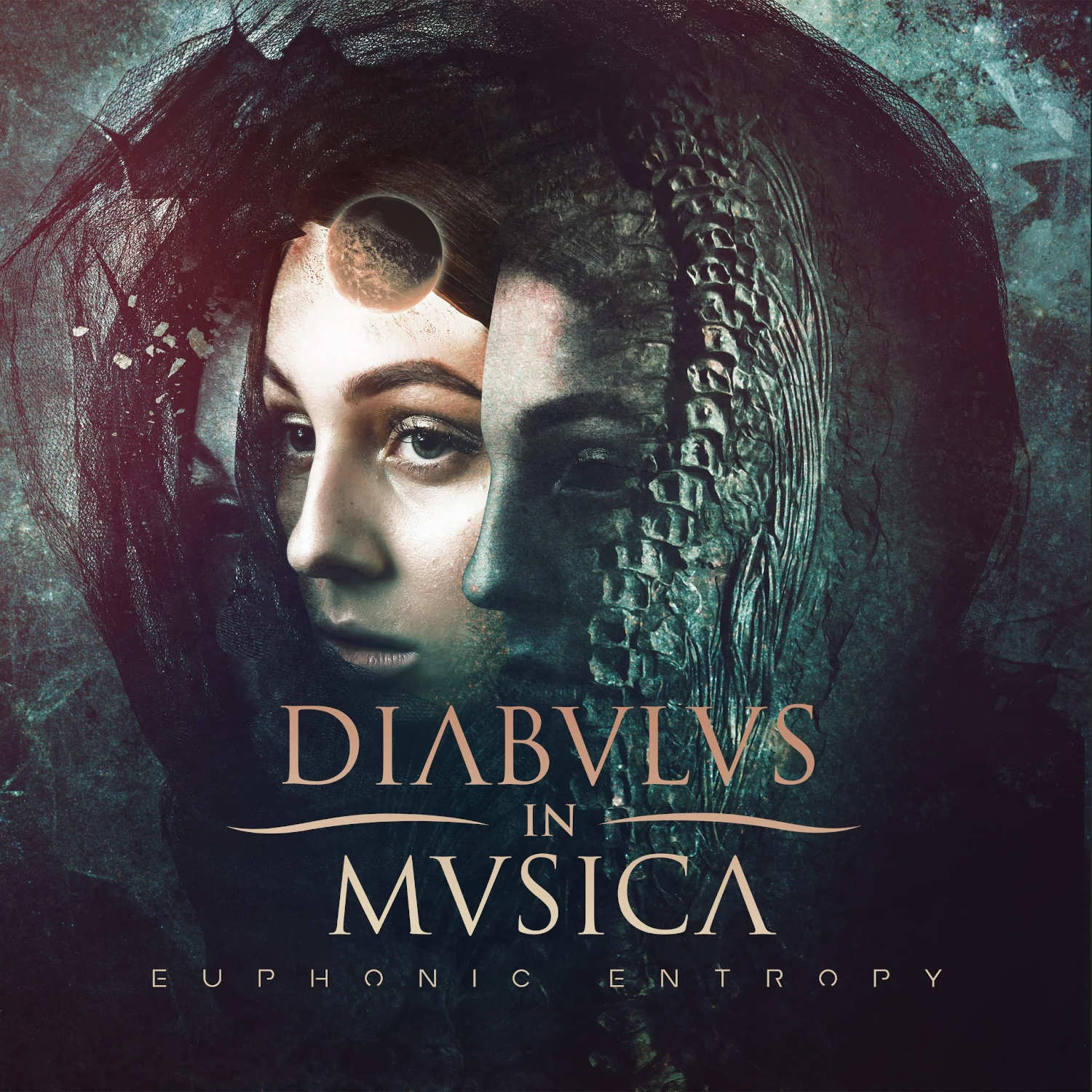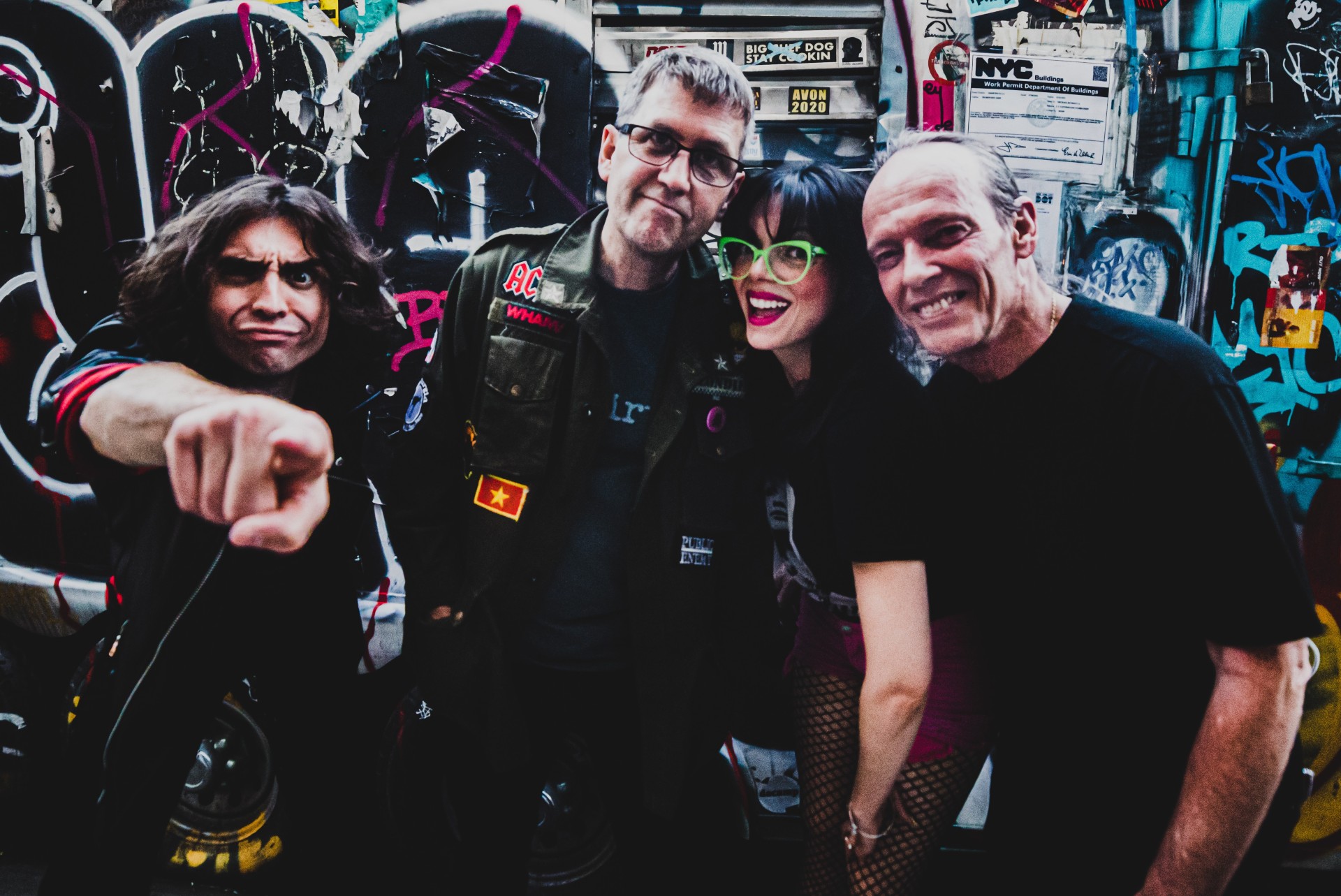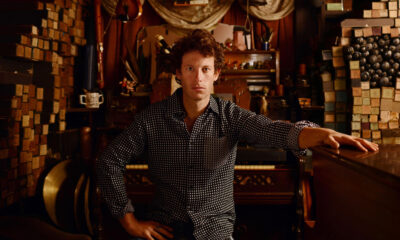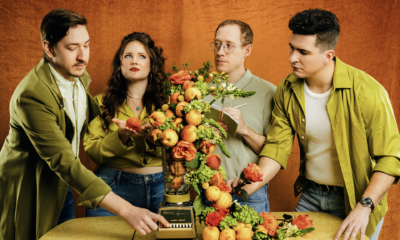Interviews
Diabulus In Musica on Their New Record ‘Euphonic Entropy,’ the Album’s Main Motivator, and Writing in Basque
Husband and wife duo, Diabulus In Musica just released their new album Euphonic Entropy via Napalm Records. We spoke with lead singer Zuberoa Aznárez about the record, the inspiration that came from the birth of their child and writing in Basque.

You could say that the pair that compose Diabulus In Musica are a match made in heaven. The duo is composed of married couple Zuberoa Aznárez as singer and Gorka Elso on keyboards. The husband and wife team just released their new album Euphonic Entropy appropriately enough on Valentine’s Day via Napalm Records, a record that thematically deals a lot with the many changes that occur in a couple’s life after the birth of a child. The writing of the album was inspired by the birth of their second child, blending beautiful classical elements with symphonic metal melodies and some damn heavy guitar riffs.
Based on the album’s theme, you would imagine this would be a toned-down affair, however, it’s anything but that. Of their five albums, Euphonic Entropy (which you can purchase now via Napalm Records) is Diabulus In Musica’s heaviest to date, proving that having children does not make you a softy. Taking matters into their own hands, the album is fully self-produced with some songs, such as “Otoi” containing lyrics sung in Basque language. It’s a multi-faceted affair and as one of Euphonic Entropy’s song titles affirms, Aznárez and Elso have taken things “One Step Higher.”
We recently spoke with Diabulus In Musica’s lead singer Zuberoa Aznárez to get the lowdown on what the dynamic is like writing and touring in a husband-wife duo, the new album Euphonic Entropy being released on Valentine’s Day, and how the birth of their child ended up being the conceptual focal point of their new record.
So, interestingly enough, you are a husband and wife who also happen to lead a very successful symphonic metal band. What’s the dynamic like writing and touring as a husband and wife and how does it compare to not being in a band together (if you have indeed previously been in a band without each other)?
Zuberoa Aznárez: “We started playing in bands before being together, but that was a long time ago and our lives were very different back then anyway because we still were students and had no more responsibilities than that. Besides, we have been together for 17 years now, so I hardly remember how it was before! (laughs) We met each other in another metal band and after about three years we decided to start our own project, Diabulus in Musica. For writing music, at the beginning, we had to adapt to each other because our music tastes, even if they seem to be similar because we love metal and classical music, (but our tastes) are actually different. It was difficult to agree in some music conceptions, but throughout the years we learned to work together and we understood this mix of tastes is what makes Diabulus in Musica special.
Each one’s role in the writing process came naturally and the work flows really well right now. If I have to say something negative, I would probably say that when there are problems in the band or at home you really cannot disconnect from this, as we live and work together, but fortunately, this doesn’t usually happen. I think that we are lucky to have the same passion (music) and that we can be together sharing what we love. It must be very difficult to keep a relationship when the other is not on this business because you need to dedicate many hours to the band, not only on tour but also studying, rehearsing, in the studio… So I’m thankful that we both are on the same train.”
Diabulus In Musica has been together now for over a decade. I’m curious, how has your songwriting changed now as compared to how you were writing together ten years ago?
Aznárez: “The process is more or less the same since our third album. On the two first releases, the whole band would take part in the compositions, but since Argia it has been mainly Gorka and me who have done all the music. We have had to adapt to the new situation and new members from then on. On the other hand, we have learned and lived a lot since 2010, so our music is also a consequence of all this, resulting in something more elaborate and mature.”

Your new album, Euphonic Entropy, happens to have had a release date of Valentine’s Day. What was the thinking behind releasing the album on the day of love and romance?
Aznárez: “It was the label who set the release date, but even if it wasn’t deliberate on our side, it has been a beautiful coincidence, not only because we are a couple and because the album talks somewhat about ourselves, but also because our first child was born that night between the 14th and the 15th of February, so everything is very symbolic.”
It’s a little ironic that an album released on Valentine’s Day also happens to be probably the heaviest of the five you have released. What motivated the heavy and hard approach to this new album?
Aznárez: “Indeed! It wasn’t something deliberate either, but it turned out this way and I think that it is because of the energy we need at this moment of our lives. Our music is simply the result of our situation right now being musicians with two little kids around. The album is heavy and energic but in a positive and optimistic way. Perhaps we relate love more to this energic state of mind than to the calmness of ballads, (laughs).”
You chose to self-produce Euphonic Entropy rather than work with an outside producer. Why did you feel things were best left in your own hands for this record?
Aznárez: “Well, our albums have always been self-produced (except for the mixing and mastering), with the exception that we got some help on our first album and on the second one, four of the band members took part on the production too. The last three albums have been done by Gorka and I (and some guitar parts by our guitar player, Alexey). We are, above all, musicians and now that we have been in this business for more than ten years, we feel our songwriting is much more solid and we have learned a lot about orchestral arrangements and production in general. We know that some bands prefer to have the help of a producer to make the songs, but we think we can manage this ourselves as we have a very clear idea about how we want the songs to sound like and also music education to work on the arrangements. We like to have full control of our music.”
So, much of the motivation for the album was provided by the birth of your second child and how life changes. How would you say your life has changed?
Aznárez: “We are the same people and we do (or try to do) the same things, nevertheless, everything has changed. Now we have two little creatures that need all our attention. I also noticed my mind is not the same, I have other fears, other joys… and priorities obviously change. Before it was ’me’ and ’us’ and now it is ’them.’ On the other hand, my love for what I do hasn’t changed and here is where I notice more of the difference. Now we don’t have time for ourselves. I decided not to take my daughter to the nursery, which means that I can only work in the mornings if she is sleeping and I must admit this is something that sometimes can be frustrating.
Also, we don’t have time for ourselves as a couple, I don’t remember the last time we went to have dinner alone for example, or to the cinema or to a concert… Anyway, it has been our choice and we enjoy different things. We are aware that time flies and that we will regret not to take advantage of every little moment we have to share with them while they are still so dependent. We can recover all the rest in a couple of years, but not the first years of our children.”
At what point after your child was born would you say you both started talking about it serving as the framework for an entire record?
Aznárez: “We didn’t think about it, it just resulted like that. We always start with the music and once the songs are finished, I write the lyrics. When we were writing and recording the songs, we realized how chaotic the process had been because of the kids. We didn’t have the same time we had before having kids and we had to work when it was possible. Once the songs were finished, we also realized the album was quite ‘fast’ maybe as a result of that need to rush because of the lack of time, this is how the topic of Euphonic Entropy was born.”
What was the writing process like for Euphonic Entropy? Did it proceed quickly and smoothly or would you say this record was a challenge for you to complete in the right way?
Aznárez: “I honestly don’t know how we did the songs. I always have the same feeling. We are so focused when we have a moment to work that, after, you look back and you are not aware about the whole process. We couldn’t plan anything as Gorka and I are the ones who do the music and production and we had to take care of a three-year-old boy and a newborn baby girl, so we just (hit) the studio when we had a moment. For the recordings we had to ask for help from our families, so that they could take care of the babies for an hour or two, to record one song. This is how our last year has been like.
Anyway, even if everything seems to be hasty it has been a slow process as we have worked a lot on the songs until we really felt they were good enough. We never thought about a deadline, but just about writing a good album independent of the time it could take. So on the one hand, I would say it has been quick because we took advantage of each moment we had to work and we were very focused on it, but on the other hand, as we couldn’t plan to work every day and for hours as we used to do before, the songs and our ears had also the time to rest and then come back to the music with a clearer mind, so we can say the process was smoothly too.”
Some of the songs featured on Euphonic Entropy, contain lyrics that are written in the Basque language, a local language in Europe that is spoken by very few people. What gave you the idea to write some lyrics in Basque?
Aznárez: “We’ve always included Basque language on our previous albums, but just some sentences, verses or titles, as well as Latin and Spanish, even if the main language in our songs is English. This time we decided to write a complete song in Basque. We are the only Spanish band on the label, so they thought it would be interesting for us to sing one or two songs in Spanish again. I proposed to sing one in Spanish and another one in Basque as it is our co-official language here and mostly an unknown one for most of the people in the rest of the world. The song talks about the loss of our cultural identity through time. Here we speak Spanish and Basque, but Basque is still a minority language in the Basque Country and Navarre and it is a big treasure as it is one of the oldest languages in Europe. That’s why we felt the need to spread the word about this important heritage.”
It’s always interesting to ask an artist what their favourite songs are on their new album, so which two or three really hold a special place for you on Euphonic Entropy?
Aznárez: “It’s a very tricky question because the songs are very different and I really like the whole album. Depending on my mood, I’d choose one or another, but I usually tend to choose the ’weird’ one (although in this album there is more than one) so I will pick as one of my favourites ’Our Last Gloomy Dance’ because it’s theatrical, funny, dark… yet chaotic at the same time. I enjoy singing it a lot. It’s that kind of song that doesn’t fit as a regular single, but that defines our sound very well. Also, a song that probably summarizes many of our usual elements for me could be ‘In Quest of Sense,’ I like that is varied, heavy and bombastic… But as I said every song in this album is special.”
With a new album out at the beginning of the year, I’m sure you have big plans for the rest of the year. What are the band’s 2020 plans as they currently stand?
Aznárez: “We have been focused on music and we relied on a booking agency to do the rest, but unfortunately, they weren’t very professional and they decided to stop working on it saying they didn’t have the time! So now we are trying to find a booking agency that can help us to book a European tour. For the moment, we can tell that we will be playing a very special show in November in our hometown, we are very excited about it!”
-

 Music3 days ago
Music3 days agoTake That (w/ Olly Murs) Kick Off Four-Night Leeds Stint with Hit-Laden Spectacular [Photos]
-

 Alternative/Rock5 days ago
Alternative/Rock5 days agoThe V13 Fix #010 w/ High on Fire, NOFX, My Dying Bride and more
-

 Hardcore/Punk2 weeks ago
Hardcore/Punk2 weeks agoHastings Beat Punks Kid Kapichi Vent Their Frustrations at Leeds Beckett University [Photos]
-

 Culture2 weeks ago
Culture2 weeks agoCirque Du Soleil OVO Takes Leeds Fans on a Unique, Unforgettable Journey [Photos]
-

 Alternative/Rock1 week ago
Alternative/Rock1 week agoA Rejuvenated Dream State are ‘Still Dreaming’ as They Bounce Into Manchester YES [Photos]
-

 Features3 days ago
Features3 days agoTour Diary: Gen & The Degenerates Party Their Way Across America
-

 Culture6 days ago
Culture6 days agoDan Carter & George Miller Chat Foodinati Live, Heavy Metal Charities and Pre-Gig Meals
-

 Music6 days ago
Music6 days agoReclusive Producer Stumbleine Premieres Beat-Driven New Single “Cinderhaze”











